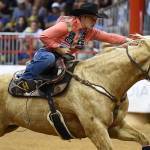Fish Oil May Help Muscle Adaptation in Athletic Horses

Post-exercise inflammation helps the body respond and adapt to exercise, ultimately boosting realization of athletic potential. Too much inflammation following training, however, can cause muscle damage and loss of performance.
How can horsemen help ensure that inflammation remains beneficial and not damaging? Feed fish oil.
“Certain fish oil is high in eicosapentaenoic acid (EPA) and docosahexaenoic acid (DHA), which have inherent anti-inflammatory properties, stunting inflammation at multiple cellular levels,” explained Kathleen Crandell, Ph.D., a nutritionist for Kentucky Equine Research.
To determine if supplemental DHA could decrease systemic inflammation in athletic horses, 20 polo ponies were offered various levels of DHA daily: 10, 20, and 50 g/day plus their regular grain and free-choice hay.* Various tests of inflammation and a lactate threshold test, a measure of physical fitness, were conducted at baseline and again 30 and 60 days after supplementation began.
Researchers found DHA levels in the bloodstream increased following oral supplementation. Only in the 10 g/day DHA group, though, was post-exercise inflammation decreased significantly. One possible explanation for this finding was that the diets lacked sufficient antioxidants, such as vitamin E.
“Kentucky Equine Research offers a fish oil supplement called EO-3 and antioxidant products such as Nano-E and Nano-Q10, all of which can help horses bounce back from physical exertion. In addition, consultation with a nutrition advisor can help ensure the diet you are offering best meets your horse’s individual needs,” recommended Crandell.
In a recent study, Kentucky Equine Research set out to determine the effect of EO-3 supplementation and exercise on blood serum gamma-glutamyl transferase (GGT) levels and inflammation. The enzyme GGT breaks down glutathione, a potent antioxidant. As levels of GGT rise, less glutathione is available to neutralize free radicals, leaving more cells susceptible to the damaging effects of oxidation. Horses supplemented with EO-3 had significantly lower levels of GGT two and four hours post-exercise compared to the control horses. This may have resulted from a reduction in inflammation observed post-exercise in the horses fed EO-3.
She added, “In addition to omega-3s and vitamin E, the electrolytes provided in Restore SR (Restore in Australia) may also support recovery from exercise.”
*Hess, T., S. Braun, K. Herkelman. 2019. The effects of various levels of docosahexaenoic acid on inflammatory markers in conditioned horses during lactate threshold tests. Journal of Equine Veterinary Science. 72:64-71.








